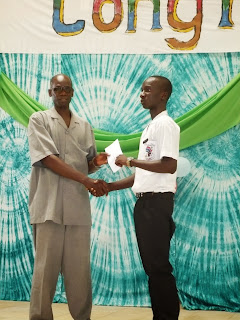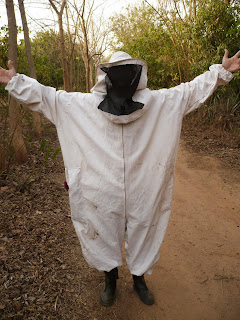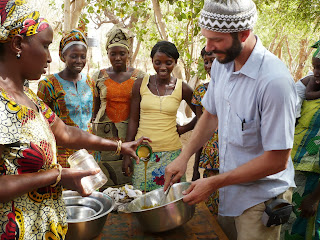Work at Sulayman Junkung General Hospital is not always exciting. I’ve recently spent a lot of time collecting information for birth certificate registrations, adding it to the official books and filling out certificates when they’re available…we’re always slightly behind on this task and I know my help is appreciated, if not particularly essential to anyone’s health and well-being (except maybe the public health officers, who can spend more time taking breakfast breaks).
I also still help out at clinic by making sure kids get the proper vaccinations, as quickly as possible. At some of the busier trekking sites, some crowd control is necessary at the vaccination station. Gambian women are a multi-talented bunch, but few of them really excel at orderly queuing.
Sometimes I have nagging doubts though – I think most Peace Corps volunteers want to feel that they did that one major project that was flawlessly conceived, perfectly executed and really helped their community in a big way. And many volunteers do! But you can’t just force a project, especially in a large community that already has a lot of resources. Many times in Bwiam I’ve had a sudden “great” idea, only to inquire and find out people are already doing whatever it is, by themselves! Sometimes the best I can do is say “Great job! I’m so happy you’re doing that! Let me know if I can help.”
I never knew much about development work before coming here and I still don’t. However, I have learned one thing: it’s really complicated. What makes a project succeed in terms of its effect on individuals or communities is pretty elusive sometimes. Having a sufficient grasp of what’s really going on in a completely different environment and culture is frankly close to impossible, even when you live alongside community members for months or years. As volunteers we see situations where foreign aid money is being poured into projects and the benefits are minimal – and people are less willing to work for their own needs because they now expect continued support. In other cases, aid is essential for people’s well-being (for example: Global Fund’s funding of antiretrovirals for HIV patients at our hospital) and the idea that the money may someday dry up or be withdrawn is very scary.
There are definitely many people here who believe that all Americans are insanely rich and should be giving them money and things all the time. It’s hard to explain that some of us are privileged in terms of our educational opportunities and skills, but we don’t have bottomless amounts of cash to share with them. A lot of people don’t want to hear that and a few will even become angry with you or call you a liar. I have been trying to put my ego aside and not fight about this – I just want to be secure in my own knowledge that I’m helping in the best way I know how. If I honestly thought that throwing money at some serious problem here would solve it for once and for all, I would be eager to raise funds, write grants or do whatever it takes. But I also believe that it’s something you really need to be careful about.
Honestly, I don’t think I’m cut out for real development work. I respect that Peace Corps is geared towards small, community-based projects. And I’m sticking with the smallest of the small. If I leave after two years knowing that a handful of people learned something about family planning, malaria prevention or prenatal care, that’s great. If a few moms remember that some crazy white lady with terrible Mandinka (and even worse Wolof) came and held their hand while they were in labor and helped them to be a little less frightened and feel a little less alone, that’s great. If some of the hospital staff got a few new ideas for how to care for their patients, that’s great.
I’m a nurse and a volunteer because I care about people. I love women’s health because I love women and I want their lives to be better. Most women in The Gambia have hard lives, but they are strong. I don’t pity them, I respect them. I want to show them my respect by working alongside them and encouraging them…and we’ll see what happens.
 |
Hospital staff educating about the benefits of prenatal care.
|



























































